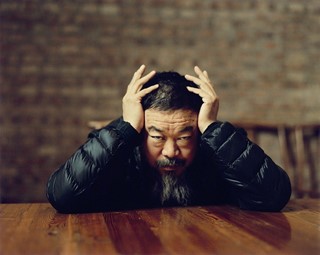The S/S13 issue of AnOther Magazine took the notion of home as its heart, here asking the thrillingly controversial Chinese artist Ai Weiwei to muse on the topic while under the imminent threat of house arrest
For the last in our series revisiting key features from our first 25 issues, Jefferson Hack travels to China to meet Ai Weiwei, an artist who is working to redefine the notion of dissidence within extraordinary confines and under the cloud of an indefinable danger. Here, in an extract from the unique interview, Hack and Ai Weiwei discuss the artist's personal notion of home, satire as conceptual art and how he uses digital means to escape the confines and contradictions of life in 21st-century Beijing.
JH: I wanted to ask you about the concept of home – what does the notion of home mean to you, and more than that, the sense of home when your homeland is in direct opposition to your beliefs?
AW: A sense of home is something you can ignore, it exists but at the same time, it is most convenient to be there. It’s like magic, you can get whatever you want but you don’t have to get it, you can ignore it, it doesn’t bother you, you don’t need it. That sense of home gives you extra power; of course, you don’t have to use it.
JH: But you’re unusual in the sense that your private life and your work life are one, your studio and your home are combined. Home is a place of constructing reality, it’s not a place of escape from a work situation. It has all of those dualities.
AW: We’re 20, 30 people here, we normally do different things, research or archiving or communications. It’s really become part of me.
JH: How do you conduct this orchestra of productivity?
AW: I think you have to be very relaxed. The costs here are lower than in the west, so you have to let everybody, every part of it, try
to reach their best and to be themselves. Then when you need them, or you are working on the same task, they have to have a sense of contributing something you really want. I think that all sides are very important.
In that sense, your surroundings are always an extension of the message of who you are. And the way you look at others is the way you want yourself to be, or what you want people to understand about you.
JH: But also, you’ve changed the kind of practices you’re doing, they are evolving and changing – for instance, your architecture practice FAKE has stopped functioning and you’ve taken on producing social investigative films, so there’s a kind of refocusing of purpose that is constantly going on.
AW: I think that the ideal of the house is to leave a space that is unpredictable, in mysterious conditions – you don’t want to get too familiar with everything. You want to leave a space that is wild, that you can sometimes search and explore. I think you should always have that, because that gives your life a very special colour, and possibilities; you have a space that is not yet reached, and it is also important to include that into a master plan. I think that’s important in anybody’s life, because it’s like a chessboard: this guy has only a few steps to move, and that’s the end of it. It’s better to create a game that grows itself and it doesn’t matter how you do it, it’s far from the end of it.
JH: But the government has banned you from communicating via websites, banned you from foreign travel by taking your passport, banned you from showing your work in your own country – in a way, they’ve pinned you into a chessboard, into a corner, and pinned you into these walls. Do you have freedom to leave the building?
AW: Now I do.
JH: But conceptually, in a way you’ve made this house your playground. I think your Gangnam Style parody for instance is a way of saying “fuck you, you’ll never take away my playfulness.” And also you just invited several million people into this environment to party with you, so you kind of dissolved the chessboard.
AW: I think that’s the game; that difficult moment is my most exciting moment.
JH: You’ve invited more people than can probably fit into Caochangdi.
AW: People start to believe in personal power, young people on the internet, they think my existence provides a kind of truth, that freedom exists within ourselves, no one can take it away. It’s just a question of how to recognise it and exercise it. That’s the most important thing, even in the most difficult conditions. They put you in a cooking pot and when the time is up you start to think, oh this is the end of it, but actually it’s the beginning. That’s art. So when they put you in this cooking pot, I try to imagine when they open the cover they would see a very different dish than the one they expected.
For the full article, and for all 25 issues in the AnOther Magazine archive, visit Exact Editions.
